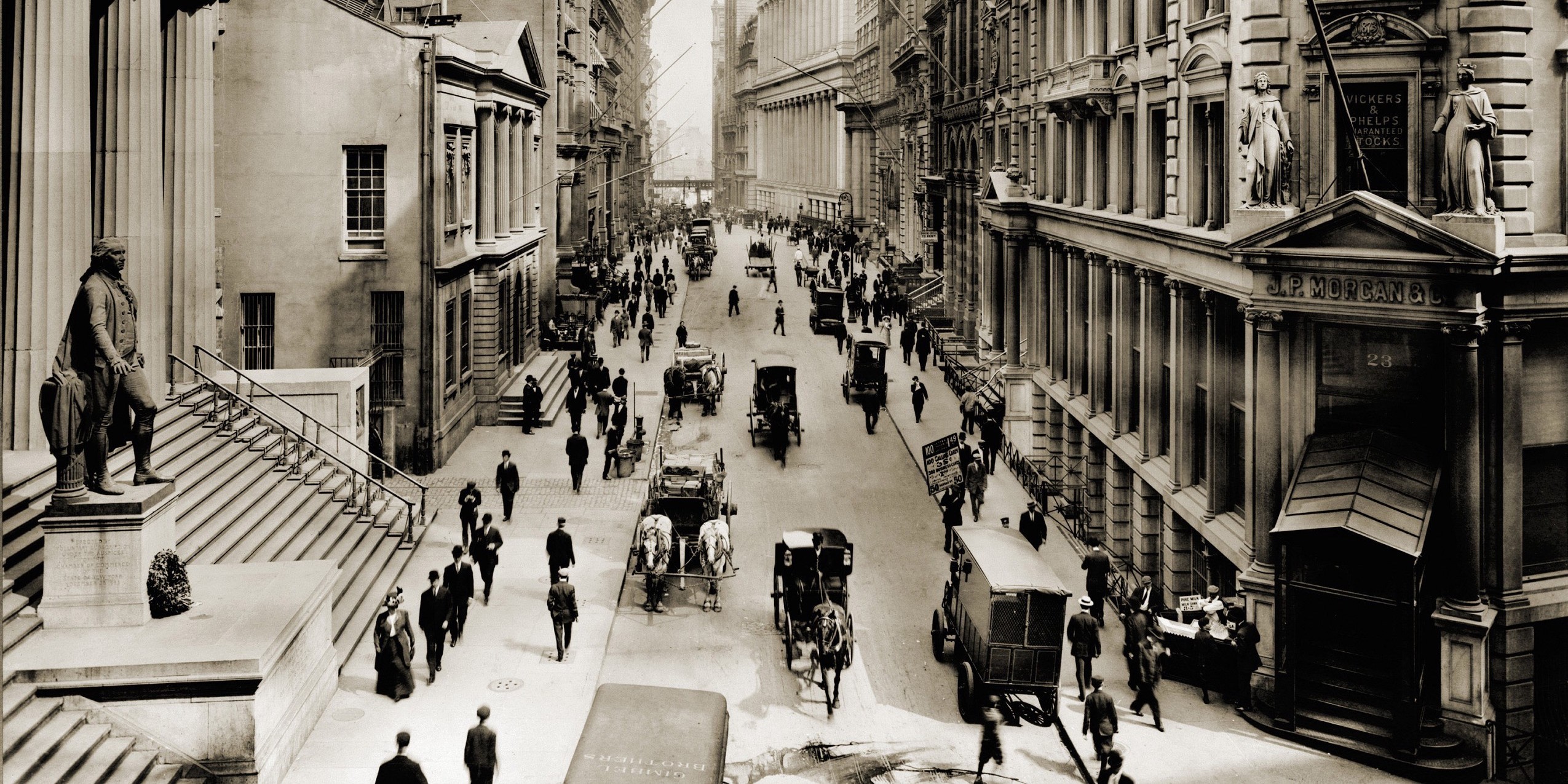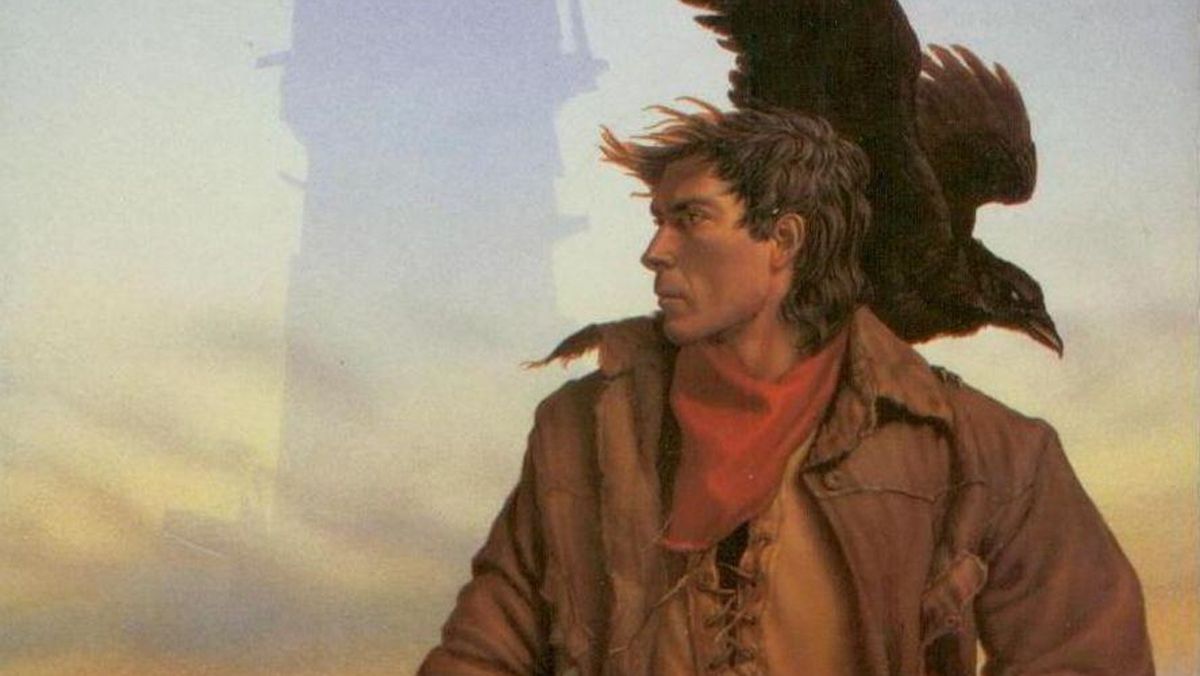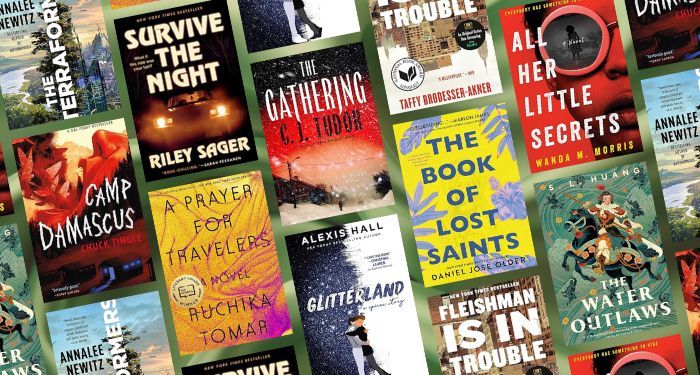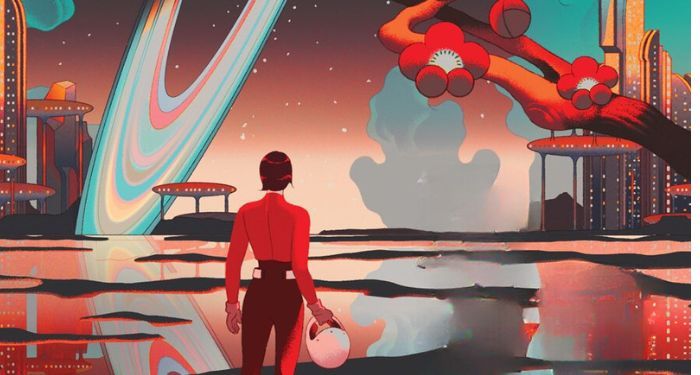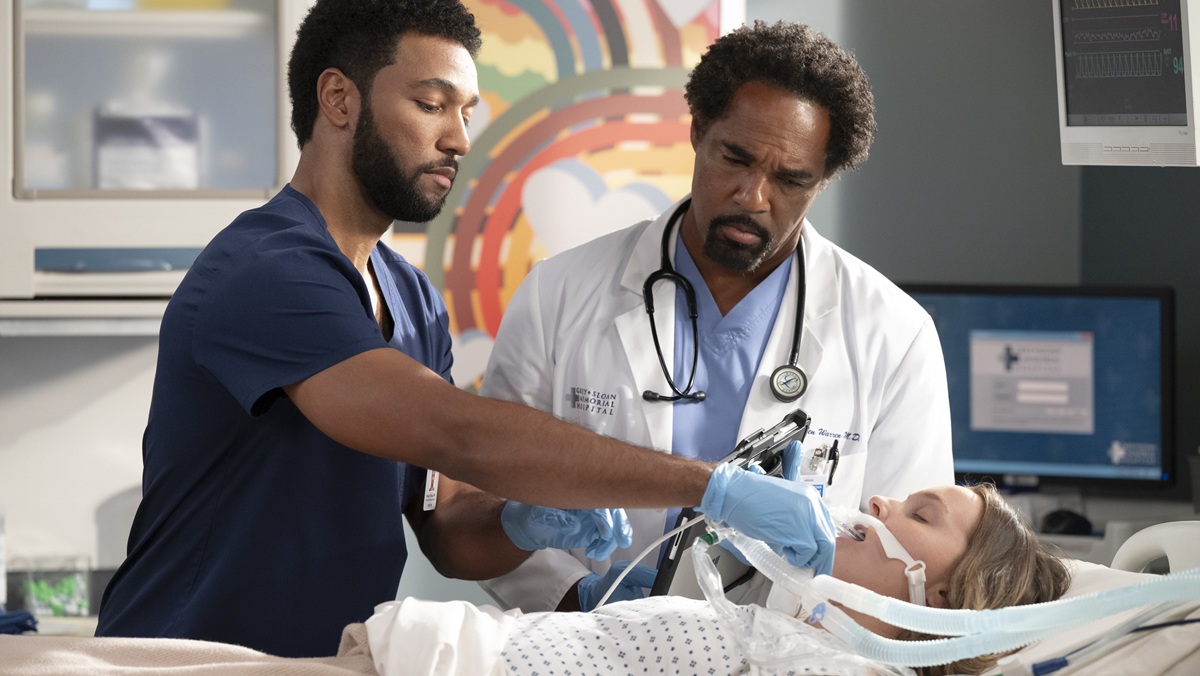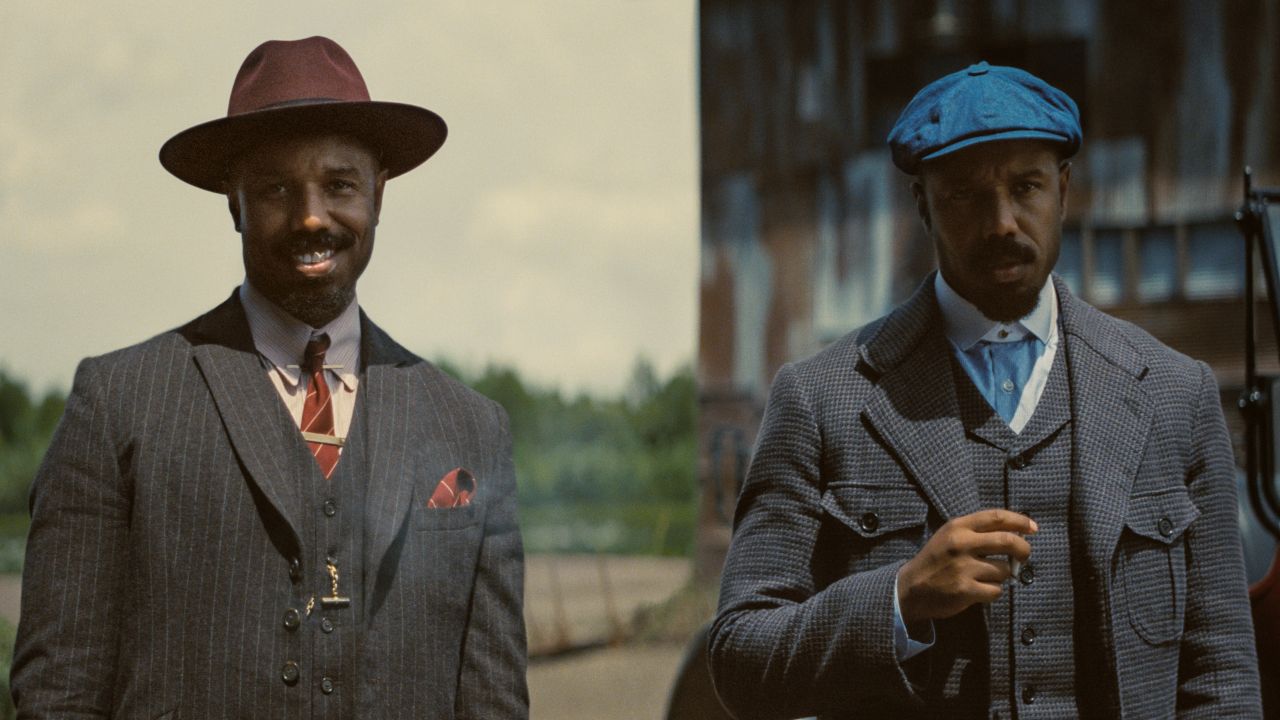Not All Men Are Wolves But Some Are
The Cry of the Pack by Elizabeth Garver Jordan
Mr. Nestor Hurd, our “feature” editor, was in a bad humor. We all knew he was, and everybody knew why, except Mr. Nestor Hurd himself. He thought it was because he had not a competent writer on his whole dash-blinged staff, and he was explaining this to space in words that stung like active gnats. Really it was because his wife had just called at his office and drawn his month’s salary in advance to go to Atlantic City. [1]
Over the little partition that separated his private office from the square pen where his reporters had their desks Mr. Hurd’s words flew and lit upon us. Occasionally we heard the murmur of Mr. Morris’s voice, patting the air like a soothing hand; and at last our chief got tired and stopped, and an office boy came into the outer room and said he wanted to see me.
I went in with steady knees. I was no longer afraid of Mr. Hurd. I had been on the Searchlight a whole week, and I had written one big “story” and three small ones, and they had all been printed. I knew my style was improving every day—growing more mature. I had dropped a great many amateur expressions, and I had learned to stop when I reached the end of my story instead of going right on. Besides, I was no longer the newest of the “cub reporters.” [2] The latest one had been taken on that morning—a scared-looking girl who told me in a trembling voice that she had to write a special column every day for women. It was plain that she had not studied life as we girls had in the convent. She made me feel a thousand years old instead of only eighteen. I had received so much advice during the week that some of it was spilling over, and I freely and gladly gave the surplus to her. I had a desk, too, by this time, in a corner near a window where I could look out on City Hall Park and see the newsboys stealing baths in the fountain. And I was going to be a nun in three years, so who cared, anyway? I went to Mr. Hurd with my head high and the light of confidence in my eyes.
“’S that?” remarked Mr. Hurd, when he heard my soft footfalls approaching his desk. He was too busy to look up and see. He was bending over a great heap of newspaper clippings, and the veins bulged out on his brow from the violence of his mental efforts. Mr. Morris, the thin young editor who had a desk near his, told him it was Miss Iverson. Mr. Morris had a muscular bulge on each jaw-bone, which Mr. Gibson had told me was caused by the strain of keeping back the things he wanted to say to Mr. Hurd. Mr. Hurd twisted the right corner of his mouth at me, which was his way of showing that he knew that the person he was talking to stood at his right side.
“’S Iverson,” he began (he hadn’t time to say Miss Iverson), “got ’ny money?”
I thought he wanted to borrow some. I had seen a great deal of borrowing going on during the week; everybody’s money seemed to belong to everybody else. I was glad to let him have it, of course, but a little surprised. I told him that I had some money, for when I left home papa had given me—
He interrupted me rudely. “Don’t want to know how much papa gave you,” he snapped. “Want to know where ’tis.”
I told him coldly that it was in a savings-bank, for papa thought—
He interrupted again. I had never been interrupted when I was in the convent. There the girls hung on my words with suspended breath.
“’S all right, then,” Mr. Hurd said. “Here’s your story. Go and see half a dozen of our biggest millionaires in Wall Street—Drake, Carter, Hayden—you know the list. Tell ’em you’re a stranger in town, come to study music or painting. Got a little money to see you through—’nough for a year. Ask ’em what to do with it—how to invest it—and write what happens. Good story, eh?” He turned to Morris for approval, and all his dimples showed, making him look like a six-months-old baby. He immediately regretted this moment of weakness and frowned at me.
“’S all,” he said; and I went away.
I will now pause for a moment to describe an interesting phenomenon that ran through my whole journalistic career. I always went into an editor’s room to take an assignment with perfect confidence, and I usually came out of it in black despair. The confidence was caused by the memory that I had got my past stories; the despair was caused by the conviction that I could not possibly get the present one. Each assignment Mr. Hurd had given me during the week seemed not only harder than the last, but less worthy the dignity of a general’s daughter. Besides, a new and terrible thing was happening to me. I was becoming afraid— not of work, but of men. I never had been afraid of anything before. From the time we were laid in our cradles my father taught my brother Jack and me not to be afraid. The worst of my fear now was that I didn’t know exactly why I felt it, and there was no one I could go to and ask about it. All the men I met seemed to be divided into two classes. In the first class were those who were not kind at all—men like Mr. Hurd, who treated me as if I were a machine, and ignored me altogether or looked over my head or past the side of my face when they spoke to me. They seemed rude at first, and I did not like them; but I liked them better and better as time went on. In the second class were the men who were too kind—who sprawled over my desk and wasted my time and grinned at me and said things I didn’t understand and wanted to take me to Coney Island. [3] Most of them were merely silly, but two or three of them were horrible. When they came near me they made me feel queer and sick. After they had left I wanted to throw open all the doors and windows and air the room. There was one I used to dream of when I was overworked, which was usually. He was always a snake in the dream—a fat, disgusting, lazy snake, slowly squirming over the ground near me, with his bulging green eyes on my face. There were times when I was afraid to go to sleep for fear of dreaming of that snake; and when during the day he came into the room and over to my desk I would hardly have been surprised to see him crawl instead of walk. Indeed, his walk was a kind of crawl.
Mr. Gibson, Hurd’s star reporter, whose desk was next to mine, spoke to me about him one day, and his grin was not as wide as usual.
“Is Yawkins annoying you?” he asked. “I’ve seen you actually shudder when he came to your desk. If the cad had any sense he’d see it, too. Has he said anything? Done anything?”
I said he hadn’t, exactly, but that I felt a strange feeling of horror every time he came near me; and Gibson raised his eyebrows and said he guessed he knew why, and that he would attend to it. He must have attended to it, for Yawkins stopped coming to my desk, and after a few months he was discharged for letting himself be “thrown down” on a big story, and I never saw him again. But at the time Mr. Hurd gave me his Wall Street assignment I was beginning to be horribly afraid to approach strangers, which is no way for a reporter to feel; and when I had to meet strange men I always found myself wondering whether they would be the Hurd type or the Yawkins type. I hardly dared to hope they would be like Mr. Gibson, who was like the men at home—kind and casual and friendly; but of course some of them were.
Once Mrs. Hoppen, a woman reporter on the Searchlight, came and spoke to me about them. She was forty and slender and black-eyed, and her work was as clever as any man’s, but it seemed to have made her very hard. She seemed to believe in no one. She made me feel as if she had dived so deep in life that she had come out into a place where there wasn’t anything. She came to me one day when Yawkins was coiled over my desk. He crawled away as soon as he saw her, for he hated her. After he went she stood looking down at me and hesitating. It was not like her to hesitate about anything.
She was forty and slender and black-eyed, and her work was as clever as any man’s, but it seemed to have made her very hard.
“Look here,” she said at last; “I earn a good income by attending to my own business, and I usually let other people’s business alone. Besides, I’m not cut out for a Star of Bethlehem. [4] But I just want to tell you not to worry about that kind of thing.” She looked after Yawkins, who had crawled through the door.
I tried to say that I wasn’t worrying, but I couldn’t, for it wasn’t true. And someway, though I didn’t know why, I couldn’t talk to her about it. She didn’t wait for me, however, but went right on.
“You’re very young,” she said, “and a long way from home. You haven’t been in New York long enough to make influential friends or create a background for yourself; so you seem fair game, and the wolves are on the trail. But you can be sure of one thing—they’ll never get you; so don’t worry.”
I thanked her, and she patted my shoulder and went away. I wasn’t sure just what she meant, but I knew she had tried to be kind.
The day I started down to Wall Street to see the multimillionaires I was very thoughtful. I didn’t know then, as I did later, how guarded they were in their offices, and how hard it was for a stranger to get near them. What I simply hated was having them look at me and grin at me, and seeing them under false pretenses and having to tell them lies. I knew Sister Irmingarde would not have approved of it—but there were so many things in newspaper work that Sister Irmingarde wouldn’t approve of. I was beginning to wonder if there was anything at all she would approve; and later, of course, I found there was. But I discovered many, many other, things long before that.
I went to Mr. Drake’s office first. He was the one Mr. Hurd had mentioned first, and while I was at school I had heard about him and read that he was very old and very kind and very pious. I thought perhaps he would be kind enough to see a strange girl for a few minutes and give her some advice, even if his time was worth a thousand dollars a minute, as they said it was. So I went straight to his office and asked for him, and gave my card to a buttoned boy who seemed strangely loath to take it. He was perfectly sure Mr. Drake hadn’t time to see me, and he wanted the whole story of my life before he gave the card to anyone; but I was not yet afraid of office boys, and he finally took the card and went away with dragging steps.
Then my card began to circulate like a love story among the girls at St. Catharine’s. Men in little cages and at mahogany desks read it, and stared at me and passed it onto other men. Finally it disappeared in an inner room, and a young man came out holding it in his hand and spoke to me in a very cold and direct manner. The card had my real name on it, but no address or newspaper, and it didn’t mean anything at all to the direct young man. He wanted to know who I was and what I wanted of Mr. Drake, and I told him what Mr. Hurd had told me to say. The young man hesitated. Then he smiled, and at last he said he would see what he could do and walked away. In five or six minutes he came back again, still smiling, but in a pleasanter and more friendly manner, and said Mr. Drake would see me if I could wait half an hour.
I thanked him and settled back in my seat to wait. It was a very comfortable seat—a deep, leather-covered chair with big wide arms, and there was enough going on around me to keep me interested. All sorts of men came and went while I sat there; young men and old men, and happy men and wretched men, and prosperous men and poor men; but there was one thing in which they were all alike. Every man was in a hurry, and every man had in his eyes the set, eager look my brother Jack’s eyes hold when he is running a college race and sees the goal ahead of him. A few of them glanced at me, but none seemed interested or surprised to see me there. Probably they thought, if they thought of it at all, that I was a stenographer trying to get a situation.
The half-hour passed, and then another half-hour, and at last the direct young man came out again. He did not apologize for keeping me waiting twice as long as he had said it would be.
“Mr. Drake will see you now,” he said.
I followed him through several offices full of clerks and typewriters, and then into an office where a little old man sat alone. It was a very large office, with old rugs on the floor, and heavy curtains and beautiful furniture, and the little old man seemed almost lost in it. He was a very thin little old man, and he sat at a great mahogany desk facing the door. The light in his office came from windows behind and beside him, but it fell on my face, as I sat opposite him, and left his in shadow. I could see, though, that his hair was very white, and that his face was like an oval billiard-ball, the thin skin of it drawn tightly over bones that showed. He might have been fifty years old or a hundred—I didn’t know which—but he was dressed very carefully in gray clothes almost as light in color as his face and hair, and he wore a gray tie with a star-sapphire pin in it. That pale-blue stone, and the pale blue of his eyes, which had the same sort of odd, moving light in them the sapphire had, were the only colors about him. He sat back, very much at his ease, his small figure deep in his great swivel-chair, the finger-tips of both hands close together, and stared at me with his pale-blue eyes that showed their queer sparks under his white eyebrows.
“Well, young woman,” he said, “what can I do for you?”
And then I knew how old he was, for in the cracked tones of his voice the clock of time seemed to be striking eighty. It made me feel comfortable and almost happy to know that he was so old. I wasn’t afraid of him anymore. I poured out my little story, which I had rehearsed with his clerk, and he listened without a word, never taking his narrow blue eyes from my face. When I stopped he asked me what instrument I was studying, and I told him the piano, which was true enough, for I was still keeping up the music I had worked on so hard with Sister Cecilia ever since I was eight years old. He asked me what music I liked best, and when I told him my favorite composers were Beethoven and Debussy he smiled and murmured that it was a strange combination. [5] It was, too, and well I knew it. Sister Cecilia said once that it made her understand why I wanted to be both a nun and a newspaper woman.
In a few minutes I was talking to Mr. Drake as easily as I could talk to George Morgan or to my father. He asked who my teachers had been, and I told him all about the convent and my years of study there, and how much better Janet Trelawney played than I did, and how severe Sister Cecilia was with us both, and how much I liked church music. I was so glad to be telling him the truth that I told him a great deal more than I needed to. I told him almost everything there was to tell, except that I was a newspaper reporter. I remembered not to tell him that.
He seemed to like to hear about school and the girls. Several times he laughed, but very kindly, and with me, you know, not at me. Once he said it had been a long time since any young girl had told him about her school pranks, but he did not sigh over it or look sentimental, as a man would in a book. He merely mentioned it. We talked and talked. Twice the direct young secretary opened the door and put his head in; but each time he took it out again because nobody seemed to want it to stay there. At last I remembered that Mr. Drake was a busy man, and that his time was worth a thousand dollars a minute, and that I had taken about forty thousand dollars’ worth of it already, so I gasped and apologized and got up. I said I had forgotten all about time; and he said he had, too, and that I must sit down again because we hadn’t even touched upon our business talk.
So I sat down again, and he looked at me more closely than ever, as if he had noticed how hot and red my face had suddenly got and couldn’t understand why it looked that way. Of course he couldn’t, either; for I had just remembered that, though I had been a reporter for a whole week, I had forgotten my assignment! It seemed as if I would never learn to be a real newspaper woman. My heart went way down, and I suppose the corners of my mouth did, too; they usually went down at the same time. He asked very kindly what was the matter, and the tone of his voice was beautiful—old and friendly and understanding. I said it was because I was so silly and stupid and young and unbusiness-like. He started to say something and stopped, then sat up and began to talk in a very business-like way. He asked where my money was, and I told him the name of the bank. He looked at his watch and frowned. I didn’t know why; but I thought perhaps it was because he wanted me to take it out of there right away and it was too late. It was almost four o’clock. Then he put the tips of his fingers together again, and talked to me the way the cashier at the bank had talked when I put my money in.
He said that the savings-bank was a good place for a girl’s money—under ordinary conditions it was the best place. The interest would be small, but sure. Certain investments would, of course, bring higher interest, but no woman should try to invest her money unless she had business training or a very wise, experienced adviser back of her. Then he stopped for a minute, and it seemed hard for him to go on. I did not speak, for I saw that he was thinking something over, and of course I knew better than to interrupt him. At last he said that ordinarily, of course, he never paid any attention to small accounts, but that he liked me very much and wanted to help me and that, if I wished, he would invest my money for me in a way that would bring in a great deal more interest than the savings-bank would pay. And he asked if I understood what he meant.
Certain investments would, of course, bring higher interest, but no woman should try to invest her money unless she had business training or a very wise, experienced adviser back of her.
I said I did—that he was offering to take entirely too much trouble for a stranger, and that he was just as kind as he could be, but that I couldn’t think of letting him do it, and I was sure papa wouldn’t want me to. He seemed annoyed all of a sudden, and his manner changed. He asked why I had come if I felt that way, and I began to see how silly it looked to him, for of course he didn’t know I was a reporter getting a story on investments for women. I didn’t know what to say or what to do about the money, either, for Mr. Hurd hadn’t told me how to meet any offer of that kind.
While I was thinking and hesitating Mr. Drake sat still and looked at me queerly; the blue sparks in his eyes actually seemed to shoot out at me. They frightened me a little; and, without stopping to think any more, I said I was very grateful to him and that I would bring the money to his office the next day. Then I stood up and he stood up, too; and I gave him my hand and told him he was the kindest man I had met in New York—and the next minute I was gasping and struggling and pushing him away with all my strength, and he stumbled and went backward into his big chair, knocking over an inkstand full of ink, which crawled to the edge of his desk in little black streams and fell on his gray clothes.
For a minute he sat staring straight ahead of him and let them fall. Then he brushed his hand across his head and picked up the inkstand and soaked up the ink with a blotter, and finally turned and looked at me. I stared back at him as if I were in a nightmare. I was opposite him and against the wall, with my back to it, and for a moment I couldn’t move. But now I began to creep toward the door, with my eyes on him. I felt some way that I dared not take them off. As I moved he got up; he was much nearer the door than I was, and, though I sprang for it, he reached it first and stood there quietly, holding the knob in his hand. Neither of us had uttered a sound; but now he spoke, and his voice was very low and steady.
“Wait a minute,” he said. “I want to tell you something you need to know. Then you may go.” And he added, grimly, “Straighten your hat!”
I put up my hands and straightened it. Still I did not take my eyes off his. His eyes seemed like those of Yawkins and the great snake in my dreams, but as I looked into them they fell.
“For God’s sake, child,” he said, irritably, “don’t look at me as if I were an anaconda! Don’t you know it was all a trick?” He came up closer to me and gave me his next words eye to eye and very slowly, as if to force me to listen and believe.
“I did that, Miss Iverson,” he said, “to show you what happens to beautiful girls in New York when they go into men’s offices asking for advice about money. Someone had to do it. I thought the lesson might come better from me than from a younger man.”
His words came to me from some place far away. A bit of my bit of Greek came, too—something about Homeric laughter. [6] Then next instant I went to pieces and crumpled up in the big chair, and when he tried to help me I wouldn’t let him come near me. But little by little, when I could speak, I told him what I thought of him and men like him, and of what I had gone through since I came to New York, and of how he had made me feel degraded and unclean forever. At first he listened without a word; then he began to ask a few questions.
“So you don’t believe me,” he said once. “That’s too bad. I ought to have thought of that.”
He even wrung from me at last the thing that was worst of all—the thing I had not dared to tell Mrs. Hoppen—the thing I had sworn to myself no one should ever know—the deep-down, paralyzing fear that there must be something wrong in me that brought these things upon me, that perhaps I, too, was to blame. That seemed to stir him in a queer fashion. He put out his hand as if to push the idea away.
“No,” he said, emphatically. “No, no! Never think that.” He went on more quietly. “That’s not it. It’s only that you’re a lamb among the wolves.” [7]
He seemed to forget me, then to remember me again. “But remember this, child,” he went on. “Some men are bad clear through; some are only half bad. Some aren’t wolves at all; they’ll help to keep you from the others. Don’t you get to thinking that every mother’s son runs in the pack; and don’t forget that it’s mighty hard for any of us to believe that you’re as unsophisticated as you seem. You’ll learn how to handle wolves. That’s a woman’s primer lesson in life. And in the meantime here’s something to comfort you: Though you don’t know it, you have a talisman. You’ve got something in your eyes that will never let them come too close. Now good-by.”
It was six o’clock when I got back to the Searchlight office. I had gone down to the Battery to let the clean sea-air sweep over me. [8] I had dropped into a little chapel, too, and when I came out the world had righted itself again and I could look my fellow human beings in the eyes. Even Mr. Drake had said my experience was not my fault and that I had a talisman. I knew now what the talisman was.
Mr. Hurd, still bunched over his desk, was drinking a bottle of ginger ale and eating a sandwich when I entered. Morris, at his desk, was editing copy. The outer pen, where the rest of us sat, was deserted by everyone except Gibson, who was so busy that he did not look up.
“Got your story?” asked Hurd, looking straight at me for the third time since I had taken my place on his staff. He spoke with his mouth full. “Hello,” he added. “What’s the matter with your eyes?”
I sat down by his desk and told him. The sandwich dropped from his fingers. His young-old, dimpled face turned white with anger. He waited without a word until I had finished.
“By God, I’ll make him sweat for that!” he hissed. “I’ll show him up! The old hypocrite! The whited sepulcher! [9] I’ll make this town ring with that story. I’ll make it too hot to hold him!”
Morris got up, crossed to us, and stood beside him, looking down at him. The bunches on his jawbones were very large.
“What’s the use of talking like that, Hurd?” he asked, quietly. “You know perfectly well you won’t print that story. You don’t dare. And you know that you’re as much to blame as Drake is for what’s happened. When you sent Miss Iverson out on that assignment you knew just what was coming to her.”
Hurd’s face went purple. “I didn’t,” he protested, furiously. “I swear I didn’t. I thought she’d be able to get to them because she’s so pretty. But that’s as far as my mind worked on it.” He turned to me. “You believe me, don’t you?” he asked, gently. “Please say you do.”
I nodded.
“Then it’s all right,” he said. “And I promise you one thing now: I’ll never put you up against a proposition like that again.”
He picked up his sandwich and dropped the matter from his mind. Morris stood still a minute longer, started to speak, stopped, and at last brought out what he had to say.
“And you won’t think every man you meet is a beast, will you, Miss Iverson?” he asked.
I shook my head. I didn’t seem to be able to say much. But it seemed queer that both he and Mr. Drake had said almost the same thing.
“Because,” said Morris, “in his heart, you know, every man wants to be decent.”
I filed that idea for future reference, as librarians say. Then I asked them the question I had been asking myself for hours. “Do you think Mr. Drake really was teaching me a—a terrible lesson?” I stammered.
The two men exchanged a look. Each seemed to wait for the other to speak. It was Gibson who answered me. He had opened the door, and was watching us with no sign of his usual wide and cheerful grin.
“The way you tell it,” he said, “it’s a toss-up. But I’ll tell you how it strikes me. Just to be on the safe side, and whether he lied to you or not, I’d like to give Henry F. Drake the all-firedest licking he ever got in his life.”
“You bet,” muttered Hurd, through the last mouthful of his sandwich. Mr. Morris didn’t say anything, but the bunches on his jaw-bones seemed larger than ever as he turned to his desk.
I looked at them, and in that moment I learned the lesson that follows the primer lesson. At least one thing Mr. Drake had told me was true—all men were not wolves.

